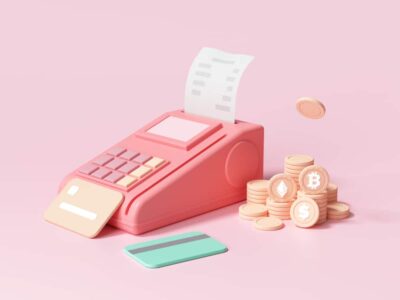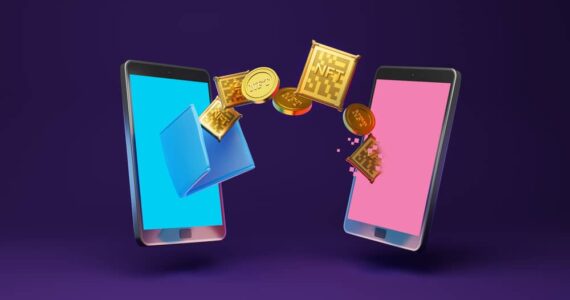Jasmine Birtles
Your money-making expert. Financial journalist, TV and radio personality.

It feels like just about every other day there’s a new financial abbreviation to get your head around. One of the more recent terms to crop up is ‘DeFi’. But what on earth does it mean, and more importantly – can you make money with it?
In this guide, we’re going to cover all the essential details you need to know about DeFi. You’ll find out where the term comes from, how it all works, and ways you can profit.
Keep on reading for a complete breakdown or click on a link below to head straight to a specific section…
This refers to ‘Decentralised Finance’, abbreviated to the slightly catchier ‘DeFi’.
If you’re wondering how to pronounce it so that you can look extra smart when bringing it up over a summer BBQ – it’s ‘dee-fye’.
Decentralised finance itself was birthed as an offshoot of the cryptocurrency movement over the last decade or so.
Just like the premise of most cryptocurrencies is to be decentralised with no single person, company, or government in control – DeFi aims to carry this aim into the world of finance.
Right now, most of your money will be held by either banks or companies. This is a centralised system and one that doesn’t always have your best interests at heart.
The reason your needs aren’t put first is that the motivation for these organisations to make money far outweighs their desire to look after you. Sometimes the same can be said for governments as well.
A decentralised financial system could benefit you in many ways:
Essentially, DeFi creates large peer-to-peer networks. So, whether you’re dealing with an individual or a business, you can use the network to transfer value.
Most banks and financial institutions aren’t too keen on this idea because it would render most of them pretty useless.
Because, at the core of most financial firms, they’re just middlemen (or women) simply facilitating a transaction.

Blockchain technology (the tech that underpins cryptocurrencies like Bitcoin) is the foundation for DeFi.
The blockchain used will be created with fancy computer code so that everything happens automatically.
Any transactions can be secured and validated from the whole network. The main driver behind most of this was peer-to-peer lending (P2P).
DeFi allows you to link up with someone from anywhere in the world and either lend someone money, or borrow some yourself.
Because it’s just a piece of code that keeps everything in order, it’s a much cheaper way to transact.
An algorithm doesn’t have the same kind of overheads that banks and companies do. No fancy offices or overpaid executives (the robots haven’t worked that out yet).
The result is that you can often borrow much more cheaply than if you approach a bank. And, you can lend out for a better return than the mighty 1% return you might get with a savings account.
It’s definitely possible, but it’s important to remember the technology is still in its infancy. There’s a long way to go before DeFi becomes mainstream. That’s if the powers that be don’t stop it in its tracks.
The three main ways to make money are:

This is the term for interacting directly with other users directly or through some sort of decentralised platform.
With DeFi lending, you might lend directly to another person. Or, you might put your money into a big pool with other people.
If someone wants to borrow from you or from the pool of money, you get rewarded with interest.
This sounds super technical and downright weird, but it’s fairly straightforward really. It also involves putting your cryptocurrency tokens into a big pool.
Think of your crypto like actual liquid in an actual pool. These big liquidity pools are then used to allow decentralised crypto exchanges to work and transact.
For providing some liquidity, you get a reward. This tends to be the most high-risk, high-reward DeFi money-making option.
This can incentivise crypto holders to hang onto tokens. Instead of letting your crypto gather dust in a wallet or on an exchange, you can choose to ‘lock it up’ on a network.
Think of it like a fixed-rate savings account. You pledge a certain amount and agree to leave it alone for a period. As a reward, you get some interest in the form of extra crypto coins.
You get a reward because you’re basically helping the network. But, sometimes there is a specific minimum amount of tokens you need to do this.
If you’re with me so far, you’re probably thinking – ‘all that mumbo jumbo is great, but how can I practically make some cash without a computer science degree?’.
Luckily, as crypto becomes more mainstream, straightforward ways to make money with DeFi are emerging.
To access the best rewards, you need to be somewhat in the loop and able to decipher ‘good’ or ‘bad’ protocols. Unless you can read computer code, this can be tough.
So, if you’re like me and you want some return with the minimal amount of effort, here’s two easy ways to earn with DeFi right now:
This is a major crypto platform based in the US but open to UK customers.
If you open an interest account with them, you can earn a return on your cryptocurrency. The rates vary and depend on the coin.
But, if you hold a US dollar stablecoin such as USDC – the current return is 7%. The reason you get a return is that BlockFi lends your money to companies and individuals. Pretty much exactly what a bank does, except you get to keep more of the profit.
FTX is quickly becoming a major global player as a cryptocurrency exchange.
On their platform, you can earn up to 8% on any assets worth less than £10,000.
So, that interest could be earned on your Bitcoin or Ethereum. Or, you can even earn that 8% interest on pounds and euros held in your account.

All of this may sound pretty rosy, but there are some major risks.
Only recently, a major ‘stablecoin‘ Terra UST crashed and de-pegged from the dollar. Wiping about $45bn from the crypto market in the blink of an eye.
Here are some of the risks to keep in mind:
Like with most areas in the crypto space, you can make some great returns. But, there is also the chance that you could lose everything.
So, make sure you’re careful and don’t invest more than you can afford to lose. There are relatively secure ways to make money with DeFi, but there are no guarantees or safety backstops.
This is not financial or investment advice. Remember to do your own research and speak to a professional advisor before parting with any money.
